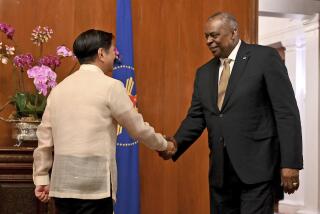Struggling Philippine Oil Company Branches Into Electricity, Crystal : Asia: Shares of Basic Petroleum and Minerals dropped by 70% after years of profit.
- Share via
MANILA — Oil exploration is risky business. Just ask Basic Petroleum and Minerals Corp.
Profits at the small Filipino company grew dramatically in 1992 and 1993. Then, last year, sea water seeped into its most profitable offshore wells. As a result, Basic, which reported $5 million in revenue for 1993, has lost money so far in 1994.
Now Basic, which jumped into oil exploration from the exotic business of farming prawns, is branching out further into less risky undertakings. It’s in chemicals, electric power generation--and making crystalware.
A collection of Waterford Crystal from Ireland--gleaming hand-crafted goblets, tumblers and bowls--scattered about Basic’s otherwise quite ordinary executive offices in the Makati financial district serves as a reminder of the crystalware competition.
Started in 1968, Basic switched to oil exploration in 1972. It seemed a good move: The Philippines imports nearly 99% of its oil; it was desperate to find a domestic supply.
In the past, this poverty-ridden country lacked the capital to explore for oil, most of which is believed to be in fields thousands of feet below the ocean. Finding it is an expensive proposition.
Even today, reliance on imports makes Filipinos anxious about their fragile economy and its vulnerability to big swings in oil prices. The 1991 Persian Gulf War, for example, drove oil prices so high that it pushed inflation to 28%.
So the Philippines encourages exploration by allowing oil companies what analysts say are the most generous profit margins in Asia for pumping its oil.
Basic was founded by Jose de Venecia, now speaker of the House of Representatives and the chief legislative ally of President Fidel Ramos. De Venecia’s brother, Oscar, runs the company as chairman and president.
In a country where politics is a blood sport and deregulation of the oil industry a work in progress, those political connections count, analysts said.
“It matters in any country,” says Joven Baban, senior investment analyst with Baring Securities.
“It matters even more here.”
By 1976, Basic had discovered the first commercial oil field in the Philippines. The company really struck it rich six years later, when it found the West Linapacan field, then the largest oil discovery in the country’s history and Basic’s main source of income for the past two years. The Philippine government took only a 7% bite of the revenues, leaving the rest for Basic and its partners.
But Linapacan has fallen on hard times. Sea water began pouring into the wells last year, forcing the company to shut them down and drill new ones.
“If Linapacan dries up, we will be hurt very badly,” says Raul Ramos, Basic’s vice president and treasurer, who is not related to the Philippine president.
“That is the reason for the diversification and the constant search for new fields,” says Ramos.
In this business, after all, there’s always the chance you’ll strike it rich again.
This time it’s the West Culion oil field, southwest of Manila in the South China Sea, which analysts say could be a bonanza, because it’s so close to the fabulous Malampaya find. Malampaya--a Shell and Occidental Oil project--is projected to produce 150,000 barrels of oil per day within the next decade, enough to fill half the Philippines’ daily consumption. If West Culion is anywhere near that big, it’ll make Basic and its partners rich.
“We feel that could drive the market wild if it’s a hit,” says Ramos.
Then again, it could be a costly failure--not unknown in the oil exploration business.
The $311,000 loss reported by the company for the first half of 1994 sent its the stock plunging on the Philippine Stock Exchange.
The class A shares--which can’t be bought by foreigners, have fallen 69.5% this year to 0.016 pesos (a small fraction of a penny) in mid-September.
The class B shares, the ones foreigners can trade, tumbled 70.4%.
Basic’s most promising new business is the country’s first petrochemical plant, scheduled to open in late 1995. Basic spent $2.7 million on a 5% stake in the project, a partnership with Germany’s BASF, Thai Petrochemicals and several other local companies.
The plant will produce polypropylene resin, the primary raw material for plastic products like food packaging, intravenous blood bags, rope, grain bags and athletic wear. Now all the Philippines’ polypropylene is imported.
Another new venture: generating electric power, a business that’s booming now that the government is going all out to solve the country’s electricity crisis.
Last year, the Philippines was plunged into darkness up to 10 hours a day by an electricity shortage. Concerned that this would undercut economic growth, the government made power generation its top priority and wiped out the blackouts by Christmas.
Power is still a big concern. Basic has invested $295,000 in Island Power Corp., which is putting up a seven-megawatt plant to provide electricity to a cooperative on the island of Mindoro. Basic also has a joint venture with U.S.-based Consolidated Hydro Inc. to develop small hydroelectric power projects.
The most intriguing project, though, is the plan to manufacture fine hand-cut crystal for export to the United States. Basic has hired some former employees of Ireland’s Waterford Crystal to train a cheap Philippines labor force in making crystal.
More to Read
Inside the business of entertainment
The Wide Shot brings you news, analysis and insights on everything from streaming wars to production — and what it all means for the future.
You may occasionally receive promotional content from the Los Angeles Times.










